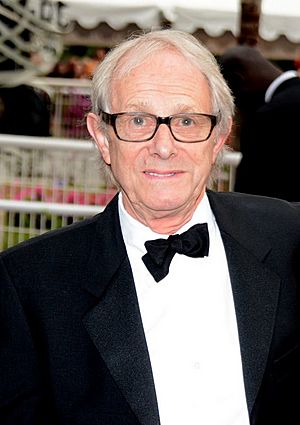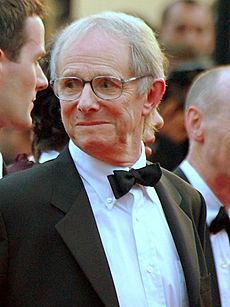Ken Loach facts for kids
Quick facts for kids
Ken Loach
|
|
|---|---|

Loach in 2014
|
|
| Born |
Kenneth Charles Loach
17 June 1936 Nuneaton, Warwickshire, England
|
| Education | King Edward VI Grammar School, Warwickshire |
| Alma mater | St Peter's College, Oxford (BA) |
| Occupation |
|
| Years active | 1962–2024 |
| Political party | Labour (1962–1994, 2015–2021) Left Unity (2012–2015) Respect (2004–2012) Independent (1994–2004, 2021–present) |
| Spouse(s) |
Lesley Ashton
(m. 1962) |
| Children | 5, including Jim |
| Relatives | Elliot Levey (son-in-law) |
Kenneth Charles Loach (born 17 June 1936) is a famous English filmmaker who has now retired. He is known for making movies and TV shows that look closely at social issues. These include topics like people struggling with money, not having a home, and workers' rights. His films often show his strong belief in fairness for everyone in society.
Two of his films, The Wind That Shakes the Barley (2006) and I, Daniel Blake (2016), won the top award, the Palme d'Or, at the Cannes Film Festival. This is a huge achievement, as only a few filmmakers have won it twice. His film Kes (1969) was even voted one of the greatest British films of the 20th century.
Contents
Early Life and Beginnings
Kenneth Charles Loach was born in Nuneaton, England, on 17 June 1936. He went to King Edward VI Grammar School. At 19, he joined the Royal Air Force. Later, he studied law at St Peter's College, Oxford. While at Oxford, he became interested in theatre and directed plays.
Starting in Television
Loach first worked as an actor in local theatre groups. Then, he became a director for BBC Television. He directed many episodes for a BBC series called The Wednesday Play. These shows often focused on the lives of working-class people and their challenges with authority.
Some of his early TV plays explored important social topics. For example, Cathy Come Home (1966) showed the difficulties faced by people without homes and jobs. Another play, In Two Minds (1967), looked at a young woman's experiences with mental health services. During this time, Tony Garnett started working as his producer, and they worked together for many years.
Filmmaking Career
While working on TV, Ken Loach also began directing movies for cinemas. His first films included Poor Cow (1967) and Kes (1969).
The Success of Kes
Kes tells the story of a boy and his pet kestrel (a type of bird). The film was very popular and well-liked. It was even named the 7th best British film of the 20th century by the British Film Institute.
Films in the 1970s and 1980s
During the 1970s and 1980s, some of Loach's films faced challenges. They were sometimes hard to find or faced political issues. For example, his documentary The Save the Children Fund Film (1971) was not shown publicly for a long time because the charity that asked for it didn't like how it turned out.
Loach also directed a four-part TV drama called Days of Hope (1975). This series showed a critical view of the military during World War I, which caused some discussion at the time.
He also made documentaries about workers' unions. One film, A Question of Leadership (1981), interviewed steel workers about their strike. Another series, Questions of Leadership, was planned but never shown on TV.
Return to Feature Films
From the late 1980s, Loach started directing more feature films regularly. These films often explored political themes and historical events.
- Hidden Agenda (1990) looked at political issues in Northern Ireland.
- Land and Freedom (1995) was about the Spanish Civil War.
- Carla's Song (1996) was partly set in Nicaragua.
He also made more personal films, like Raining Stones (1993). This film was about an unemployed man trying to buy a special dress for his daughter.
Award-Winning Films of the 2000s
In the 2000s, Ken Loach continued to make powerful films that won many awards.
- On 28 May 2006, he won the Palme d'Or at the 2006 Cannes Film Festival for The Wind That Shakes the Barley. This film was a historical drama about the Irish fight for independence in the 1920s.
- It's a Free World... (2007) told the story of a woman helping migrant workers.
- Looking for Eric (2009) was a more light-hearted film featuring famous footballer Eric Cantona.
His film The Angels' Share (2012) won the Jury Prize at the 2012 Cannes Film Festival. This film was about a young Scottish man trying to turn his life around.
Later Career and Retirement
Loach announced his retirement in 2014 but soon returned to filmmaking. He won his second Palme d'Or for I, Daniel Blake (2016). This film highlighted the struggles of a man trying to get government support after becoming ill. In February 2017, it also won a BAFTA award for "Outstanding British Film."
His 2019 film, Sorry We Missed You, also received positive reviews. In April 2024, Ken Loach confirmed that his 2023 film The Old Oak would be his last. The Old Oak premiered at the 2023 Cannes Film Festival and was praised for its social message.
Filmmaking Style
Ken Loach's films are known for their realistic style. He often uses actors who are not famous and films in real locations. He wants his movies to feel like real life.
Focus on Real People
Loach has said that he was greatly influenced by the film Bicycle Thieves (1948). This film showed him that movies could be about everyday people and their problems, not just stars or grand adventures. He believes that the struggles of ordinary people are very dramatic and important to show.
He also likes to use local dialect in his films, like the Yorkshire dialect in Kes. He feels that asking actors to speak differently would change their whole personality. Sometimes, his films are subtitled in other English-speaking countries so everyone can understand the strong accents.
Social Messages in Films
A consistent theme in Loach's films is his focus on personal relationships within bigger social or political situations. He shows how large political events affect the lives and relationships of families and friends. He explains that the political messages in his films are "embedded into the characters and the narrative."
Personal Life
Ken Loach married Lesley Ashton in 1962. They live in Bath, Somerset, and have two sons and two daughters. Their son Jim (born 1969) also became a filmmaker.
Loach is a supporter of the British Humanist Association. He believes in separating religion from government and public life. He has spoken against teaching children in separate faith schools, saying it can be divisive.
He turned down an OBE award in 1977. He explained that he didn't want to accept an award linked to the "British Empire," which he felt represented exploitation.
Loach has received many honorary degrees from universities and prestigious awards for his filmmaking. These include the BAFTA Fellowship and the Honorary Golden Bear at the 64th Berlin International Film Festival.
Filmography
Films
- Poor Cow (1967)
- Kes (1969)
- Family Life (1971)
- Black Jack (1979)
- Looks and Smiles (1981)
- Fatherland (1986)
- Hidden Agenda (1990)
- Riff-Raff (1991)
- Raining Stones (1993)
- Ladybird, Ladybird (1994)
- Land and Freedom (1995)
- Carla's Song (1996)
- My Name Is Joe (1998)
- Bread and Roses (2000)
- The Navigators (2001)
- Sweet Sixteen (2002)
- 11′09″01 September 11 (segment "United Kingdom") (2002)
- Ae Fond Kiss... (2004)
- Tickets (2005)
- The Wind That Shakes the Barley (2006)
- It's a Free World... (2007)
- Looking for Eric (2009)
- Route Irish (2010)
- The Angels' Share (2012)
- Jimmy's Hall (2014)
- I, Daniel Blake (2016)
- Sorry We Missed You (2019)
- The Old Oak (2023)
Television
- Catherine ("Teletale", 1964)
- Z-Cars (series episodes, 1964)
- Diary of a Young Man (series, 1964)
- Tap on the Shoulder (The Wednesday Play, 1965)
- Wear a Very Big Hat (The Wednesday Play, 1965)
- Three Clear Sundays (The Wednesday Play, 1965)
- Up the Junction (The Wednesday Play, 1965)
- The End of Arthur's Marriage (The Wednesday Play, 1965)
- The Coming Out Party (The Wednesday Play, 1965)
- Cathy Come Home (The Wednesday Play, 1966)
- In Two Minds (The Wednesday Play, 1967)
- The Golden Vision (The Wednesday Play, 1968)
- The Big Flame (The Wednesday Play, 1969)
- The Rank and File (Play for Today, 1971)
- After a Lifetime ("Sunday Night Theatre", 1971)
- A Misfortune ("Full House", 1973)
- Days of Hope (serial, 1975)
- The Price of Coal (1977)
- The Gamekeeper (1980)
- Auditions (1980)
- A Question of Leadership (1981)
- The Red and the Blue: Impressions of Two Political Conferences – Autumn 1982 (1983)
- Questions of Leadership (1983/4, untransmitted)
- Which Side Are You On? (1985)
- End of the Battle... Not the End of the War ("Diverse Reports", 1985)
- Time to Go ("Split Screen", 1989)
- The View From the Woodpile (1989)
- The Arthur Legend ("Dispatches", 1991)
- The Flickering Flame (1996)
- Another City: A Week in the Life of Bath's Football Club (1998)
Documentaries
- The Save the Children Fund Film (1971)
- A Contemporary Case for Common Ownership (1995)
- McLibel (2005)
- The Spirit of '45 (2013)
Filmmaking Awards and Recognition
Ken Loach has received many important awards for his films. He has won the Palme d'Or at the Cannes Film Festival twice, for The Wind That Shakes the Barley (2006) and I, Daniel Blake (2016). He has also won the Jury Prize at Cannes three times.
His film Kes (1969) was named the 7th best British film of the 20th century by the British Film Institute. His TV play Cathy Come Home (1966) was also ranked as one of the best British TV programmes ever.
See also
 In Spanish: Ken Loach para niños
In Spanish: Ken Loach para niños
 | Sharif Bey |
 | Hale Woodruff |
 | Richmond Barthé |
 | Purvis Young |


